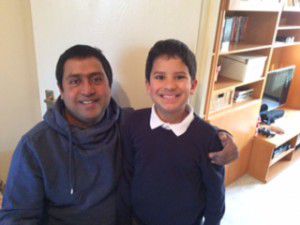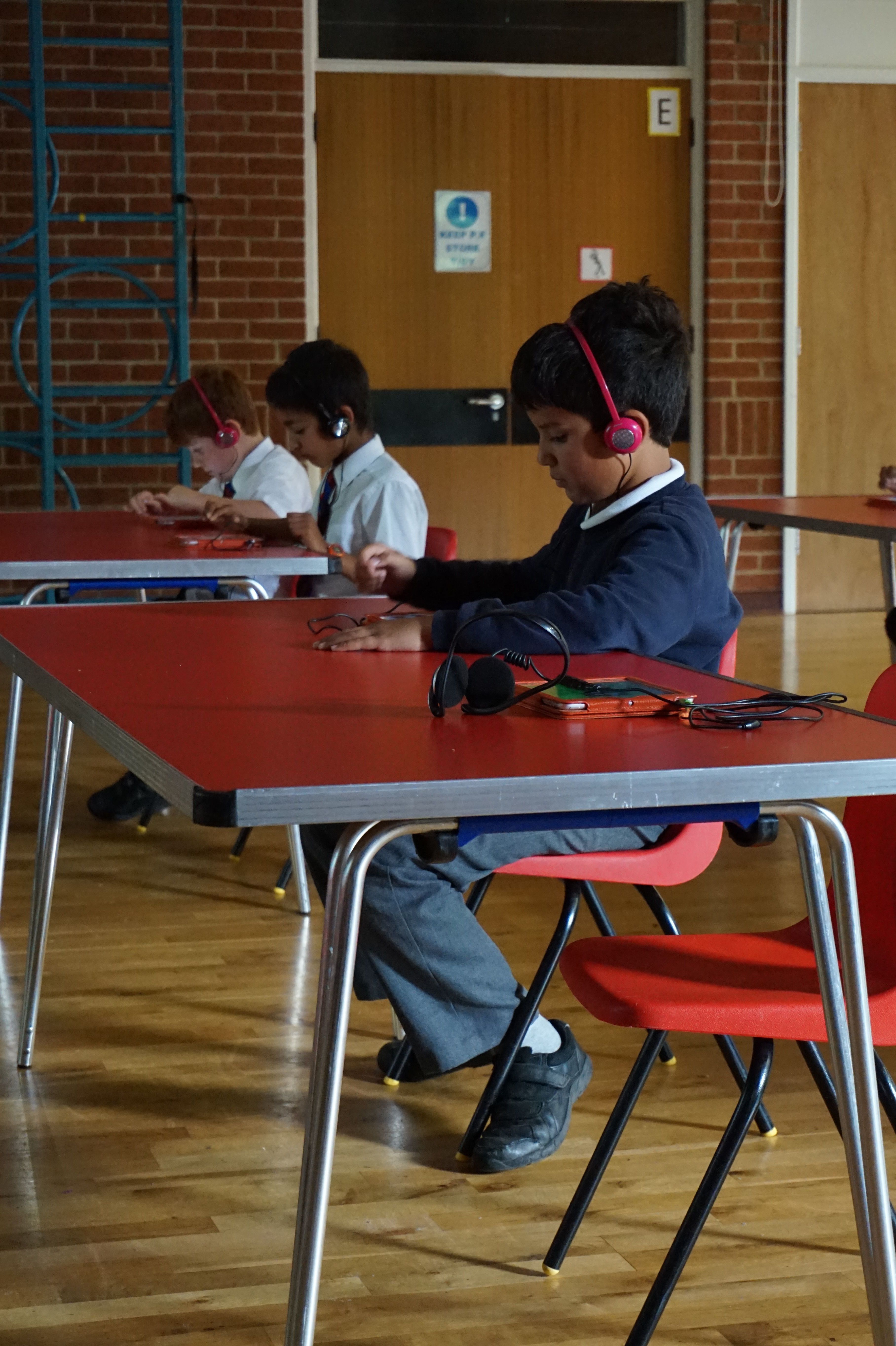Counting the days: Reuben can’t wait for his 4th Junior Language Challenge
In today’s blog post, father and son Joseph and Reuben share with us their JLC story and how learning made fun got them counting the days until this year’s competition.
If you’re a parent or teacher of children aged 10 and under in the UK, visit juniorlanguagechallenge.com to find out more about our annual competition, which opens on Friday 11th March.
Reuben was just 6 and in Year 2 when a teacher with a passion for languages opened the JLC to this year group for the 1st time. Reuben got stuck in to learning Spanish, then Greek, breezed past most of the school including the Y6s and in to the East-Midlands’ semi-final. He came 4th. This was an inspiration to the other children that left them waiting for the next JLC. His success justified an early introduction of Abbey Road children to the exciting challenge of learning a new language. The sheer passion and excitement with which he approached the languages, the colourful child-friendly software and the brain-teasing range of games that increased in difficulty as his competence increased and introduced the language as it might be used in every-day life, kept him glued to learning, so much so that he was at it during every waking moment. For once, we parents did not have to battle with him to get off his game console or the iPad! Most importantly he remains as enthusiastic and motivated several challenges on.
 Reuben waited eagerly for his next shot at the JLC in Year 3. While the 1st round was a doddle for him, he crashed ignominiously out of the semi-final, learning an important life lesson, that there is no substitute for hard work. Rather than letting this get him down, he worked very hard and consistently in Year 4, at gaining a working knowledge of Portuguese, then Mandarin and qualified for the final in London. He was very excited and enthused by his success and immersed himself in learning Arabic for this. The fierce competition did not deter him but rather spurred him on and he came 13th after a hard fought set of heats.
Reuben waited eagerly for his next shot at the JLC in Year 3. While the 1st round was a doddle for him, he crashed ignominiously out of the semi-final, learning an important life lesson, that there is no substitute for hard work. Rather than letting this get him down, he worked very hard and consistently in Year 4, at gaining a working knowledge of Portuguese, then Mandarin and qualified for the final in London. He was very excited and enthused by his success and immersed himself in learning Arabic for this. The fierce competition did not deter him but rather spurred him on and he came 13th after a hard fought set of heats.
Having enjoyed himself so much and coming within a hair-breadth of winning, he continues his JLC journey. He cannot wait for this year’s challenge to begin. He is counting the days!
Joseph Chandy
___
I started the Junior Language Challenge in Year 2 at the age of 6 and have taken the Challenge every year since then. It is an amazing experience that I look forward to.
I love languages and was extremely interested in participating. I loved the way the games were laid out. This makes them really easy to understand and play and most importantly, it makes the whole experience really fun. No matter how hard the language is or may seem, EuroTalk makes it easy to learn and understand.
JLC combines two extremely important things in life, having lots of fun and language learning. It’s definitely not boring; it’s one of the best and most exciting experiences you can have. I love the competition it creates; the urge to win in all competitors is great. One of the things I love about the JLC is how you can share the massive excitement and competitiveness with other people who are also in the challenge. I strained to be at the top of the scoreboard, competing with my friends Adam and Farah Akbar and many others.
 Getting to the semi-final and final is a special feeling I will never forget. The feeling that you’re among the best of the massive amount of participants is simply amazing. The best thing is, the entrance fee is only £5 and it goes to an absolutely wonderful cause, a non-profit organisation called onebillion, whose sole aim and cause is to give the children in Malawi a better education and a much brighter future.
Getting to the semi-final and final is a special feeling I will never forget. The feeling that you’re among the best of the massive amount of participants is simply amazing. The best thing is, the entrance fee is only £5 and it goes to an absolutely wonderful cause, a non-profit organisation called onebillion, whose sole aim and cause is to give the children in Malawi a better education and a much brighter future.
I hope that more people can join the Junior Language Challenge and share this brilliant experience. I love the Junior Language Challenge and I will never forget it. JLC 2016 is a few mere days away!
Reuben Chandy
The Year of the Monkey
Happy Chinese New Year!
Today is the first day of the Chinese Lunar New Year. The period before Chinese New Year is one of the biggest annual migrations of people, all going home to their families to celebrate together. This is for the New Years Eve dinner, also known as the reunion dinner, normally done at home rather than in a restaurant. A variety of dishes are served at the reunion dinner, these usually include fish and dumplings, which signify prosperity. It also includes lettuce, shallots, celery, duck and Chicken – each of these represent a different attribute.
The Chinese Zodiac has a different animal representing a year on a 12-year cycle. Meaning that the year of the Monkey hasn’t happened since 2004 and won’t happen again until 2028. The monkey is the 9th animal in the Zodiac and each animal is said to have different attributes. If you were born in the year of the Monkey, you’re thought to be sociable and innovative. Every zodiac sign has lucky numbers, colours, flowers and even directions. Next year the year of the Rooster will be celebrated.
Chinese New Year is celebrated with the colour red, which is seen as a sign of good fortune. Red envelopes/packets with money in, called Ang Pow are given on Chinese New Years and are a sign of future success. It is also seen as favourable to give an even amount of money rather than an odd amount. These are very different to Pak Kum, which are white envelopes given at sad occasions like funerals.
There are many taboos, which surround the New Year, these are things that shouldn’t be done on the first day of the year.
- Washing your hair – this shouldn’t be done, as it’s a sign of washing away good fortune.
- Taking medicine – if you take medicine on the first day this means you will be sick for the whole year.
- Wearing black or white – these are mourning colours.
Do you have or know of any Chinese New Year traditions? Let us know!
How to keep New Year’s resolutions
We’re well settled into the new year and we’re all full of hopes and dreams for the next 12 months – learning a new language, getting fit, changing our job, travelling more. Most likely in the first week of the year you were super pumped, ready to drop anything to stick to your main goal(s).
By the time the second week came however, you kind of settled in, relaxed the rules a bit and got back to some of your old habits. When January’s over, your goal will be completely forgotten like it was never there and you’re going to be thinking ‘how silly of me to think that I could learn Spanish’.
That can be one of the ways the future looks. Let’s take a different turn. Lets push through the phase when we want to give up and see what happens. The other road is familiar but wouldn’t it be nice to see what else can happen? What if you did learn Spanish this year? You could read books in Spanish, and you could talk to other Spanish speakers, and on your next holiday in Spain you could strike up a conversation with a stranger and end up making new friends.
Studies have shown that the human brain tends to value immediate rewards more than future rewards. When you set a goal or a resolution you are in fact making plans for your future self and it ‘s easy to imagine how your life can look. But, when the time comes that you actively pursue that goal most people choose immediate gratification and opt to do what they feel like in the moment.
Now that we understand how our mind works, it’s time to find ways to stop this from happening.
- Start slowly and build a ritual. Set yourself to practice for half an hour a day – that’s not too much to ask right? Offer yourself a reward after – if you’re learning a language with uTalk, the reward comes in the form of earning points and we all like to build up to a nice score, right?
- Put aside some of your other tasks. Obviously not work or eating but if you usually browse the Internet while commuting why not replace that with your main goal?
- Keep your eyes on the prize – never lose sight of your motivation. Look at pictures of beautiful Spanish landscapes and imagine yourself having a chat with the locals, or listen to Spanish songs and try to understand the lyrics.
I hope this helps you push through the temptation of giving up and will ultimately get you to your goal. And don’t worry about making mistakes; the only person who loses is the one that gives up, so no matter how slow you are going, it’s still better than if you weren’t doing anything.
And if your goal is to learn a language (or twelve…), there’s still time to join the uTalk Challenge!
Ioana
EuroTalkers try… Chinese Mooncakes
Every year on the 15th day of the 8th month of the Chinese lunar calendar, millions of ethnic Chinese celebrate the Mid-Autumn Festival (中秋節, pinyin: Zhōngqiū Jié) around the world. This year it falls on 27th September, but you’ll find that festivities are held throughout the month. It is thought to originate from ancient times when people would worship the Mountain Gods after the harvest was complete.

Today, the festival is celebrated not only to honour the moon and the rewards of the harvest, but to gather with friends and family in a celebration of unity and harmony. One of the traditions (and for me the most exciting part of the festival) includes the making and sharing of mooncakes (月餅, pinyin: yuè bĭng). I absolutely loved eating mooncakes growing up and couldn’t believe how many types and flavours you can get now on my recent trip back to Singapore & Malaysia.

These little beauties are a type of pastry commonly filled with lotus bean paste (蓮蓉, pinyin: lían róng). You’ll also often find ones that contain a salted egg yolk which represents the full moon.
It’s not really a flavour/texture that I’ve found anywhere in Western food culture, so I decided that I would ‘subject’ my colleagues to a bit of a mooncake tasting session. With 4 flavours to choose from namely green tea, pandan, red lotus and white lotus, who would be able to resist these sweet delights? I definitely wasn’t secretly hoping that no one would like them… just so there would be more left for me! Check out the video below to see their reactions!
Are you a mooncake fan or a mooncake newbie? Either way we wish you a very happy and mooncake filled Mid-Autumn Festival! 中秋快乐! Zhōngqiū kuàilè!
Safia




